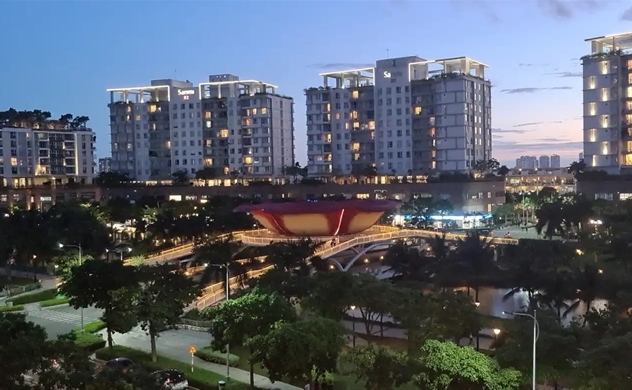
Ho Chi Minh City has plenty of upmarket condos, but analysts hope a market correction will bring Vietnam's prices back down to earth. Photo by Lien Hoang.
Vietnam hopes property shakeup will remedy supply-demand mismatch
While real estate turmoil in China has grabbed global headlines, similar issues have hit the manufacturing powerhouse next door, where a government crackdown on corruption has added to the challenges of a property market recovery.
As in China, homebuyers in Vietnam often pay in installments before construction is finished, leaving them vulnerable to builders that go under.
Developers have struggled to finance projects ever since bond markets were roiled last year when several executives were arrested on charges including allegedly breaching bond regulations.
Risks for buyers could be mitigated by increasing transparency in the real estate industry, says Tran Tuan Cuong, CEO of YouHomes, a web platform for brokers. Some builders take deposits before they even secure permits, for example.
"Developers set the game in their own way," Cuong said in an interview, adding that Vietnam hopes to avoid the drawn-out crisis across the border. "We observe the Chinese market. It improves a little bit but [then] is disrupted again."
Bond default rates have been 25% this year, dominated by the real estate sector, according to financial data provider FiinGroup.
Credit performance is "deteriorating, especially with residential property developers," FiinGroup Chairman Nguyen Quang Thuan said.
Some of the current pain can be traced to a speculative fever for luxury properties that led developers to focus on the high-end market at the expense of more affordable housing.
"Especially with vacation property, it was a kind of bubble," Cuong said. "The supply was too much, then speculators invested in this segment."
There are signs that this bubble is deflating. Apartment sales in Ho Chi Minh City dropped 33% last quarter annualized, according to property services firm JLL. The price and new supply of high-end homes in Vietnam's biggest city has dropped steadily since late 2022, JLL data shows.
The government has addressed some of the issues in the sector. Hanoi said earlier this year the "price level must be brought to a level suitable" to the developing country and set a target of building 1 million affordable homes.
Vietnam also enacted Decree 65 last year, with stricter rules on bonds' disclosures and who may buy them.
This addresses "the misuse of bond proceeds by several issuers and the distribution of private placement bonds to unqualified individual investors," FiinGroup's Thuan told Nikkei Asia.
From January, moreover, ratings will be required of more bond issuers.
The regulatory tightening followed last year's arrests for bond-related violations, which at the time prompted investors to pull out of fixed-income assets and made it more difficult even for healthy companies to roll over debt. The corruption crackdown that led to the arrests also scared bureaucrats, who slowed real estate licensing to avoid unintended mistakes.
"Some officials ... have a fear of wrongdoing, fear of responsibility, fear of legal risks leading to extortion," said an Aug. 4 state summary of a property conference. They "don't dare to make decisions."
YouHomes' Cuong said he is hopeful that a shakeout in the market will lead to more rationally priced housing.
That could attract buyers at a time when people are otherwise glum about the economy. Industrial employment declined 3.9% in July versus a year earlier, according to the General Statistics Office, and workers are feeling the pinch after the export-based economy failed to rebound as anticipated this year.
Real estate is witnessing "short-term pains, which result from the government's measures to correct the ills of the past," Colliers Vietnam CEO David Jackson told Nikkei Asia.
While some homeowners may adopt a buy-the-dip strategy in this downturn, he sees an opportunity for developers that can meet the vast demand for midrange homes.
"Smart investors can hit pay dirt in the most challenging times," he said. While it will take "at least a few more quarters" for the whole market to bounce back fully, he added, "I believe that the eye of the storm has passed."
Nguồn Nikkei Asia

 English
English



_191532742.png)




_399399.jpg?w=158&h=98)
_221453960.jpg?w=158&h=98)




